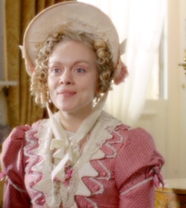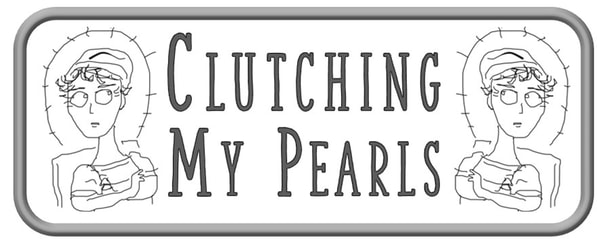| Clutching My Pearls is about Jane Austen and the times she lived in. The opinions are mine, but I don't claim originality. Much has been written about Austen. Click here for the first in the series. |
 Christina Cole in the 2009 Emma
Christina Cole in the 2009 Emma We have Emma's musings about Mr. Elton's future bride in free indirect discourse, as she assures herself that Miss Hawkins cannot be the superior of Harriet in points of beauty or of bloodline: "setting aside the 10,000 l.[dowry], it did not appear that she was at all Harriet’s superior. She brought no name, no blood, no alliance. Miss Hawkins was the youngest of the two daughters of a Bristol—merchant, of course, he must be called; but, as the whole of the profits of his mercantile life appeared so very moderate, it was not unfair to guess the dignity of his line of trade had been very moderate also."
What would a contemporary reader of Austen's infer from that description? First of course, that Emma is being a snob, because Miss Hawkins "brought no name, no blood, no alliance." That part is clear enough. Emma casually tosses aside the dowry, and elsewhere she suggests that the ten thousand figure is maybe exaggerated: "so many thousands as would always be called ten." Ten thousand pounds a year invested at five percent yields an annual income of 500 pounds, a significant addition to Mr. Elton's household and a guarantee that they will be able to live in a genteel way. Nothing to sneeze at, in other words.
But what about the "Bristol--merchant?" Does that dash signify a sarcastic little "ahem"? What word is being omitted in favour of "merchant"?
 Bristol docks and quay, 1760
Bristol docks and quay, 1760 Is the word "merchant" substitute for "trader?" or for "shop-owner?" But if Mr. Hawkins is a slave trader, if the word "merchant" is supposed to be a gloss on that fact? As it happens, the elite guild in Bristol which controlled the slave trade for the city were called the the Merchant Venturers. It was this guild which was instrumental in getting Bristol involved in the slave trade in the first place. So if he is a Bristol--merchant, it might be that indeed, the late Mr. Hawkins was involved in the slave trade to some extent, or else he is being represented to the citizens of Highbury as being part of Bristol's elite business community. When Emma mentally corrects herself to "merchant," she is sarcastically inflating his status. She is not moving away from the association with the slave trade, but moving toward it.
If the late Mr. Hawkins being faulted for an affiliation with the slave trade, why would Austen go on to write that "the profits of his mercantile life appeared to very moderate" and "the dignity of his line of trade had been very moderate also."
Saying that Mr. Hawkins did not conduct a "dignified" line of trade is not a very effectual or precise way of accusing him of inhumanity. And why put him down by saying that his income was "moderate"? Should he have done more slave-trading? I think this tends to point toward the idea that Mrs. Elton's father was not in elite circles, but was a shopkeeper or a wholesaler, someone who kept a warehouse where he handled imports and exports. Perhaps the daughter of a Bristol merchant involved in the slave trade would have a much larger dowry. And he was unlikely to have owned an estate. His wealth was in portable money, so ten thousand pounds represents half of his entire estate, if we presume the other half went to Mrs. Elton's sister Selena. If anyone was involved in the slave trade, it would have been Mr. Suckling. But Austen does not take advantage of the opportunity to state it explicitly: "And all the grandeur of the connexion seemed dependent on the elder sister, who was very well married, to a gentleman in a great way, near Bristol, who kept two carriages! That was the wind-up of the history; that was the glory of Miss Hawkins." Mr. Suckling has a private estate and he's obviously wealthy. "Near Bristol" probably means the fashionable neighborhood of Clifton.
I just don't see Austen's description of Mrs. Elton as pointing toward her father being a slave-trader, though certainly he must have been participating in the related economic sphere. Emma is throwing shade because the Hawkinses are not landed gentry; they are people of low origin involved in grubby commerce. The sneers are not accusing him of cruelty, the sneers are suggesting that she knows the descriptions being offered by Mr. Elton are a way of salvaging his pride for not succeeding with Emma, so he's puffing up the connections and wealth of his new bride. In the same way, the profession of Mrs. Elton's uncle was vaguely described as being "in the law line," but he is not a lawyer.
I have more about Bristol merchants and the Bristol Merchant Venturers in the next few posts, but first, let's discuss that exchange between Jane Fairfax and Mrs. Elton concerning the "slave trade."
| In 1973, scholar J.R. Ebbatson pointed out the abolition of the slave trade had been accomplished by the time Austen published Emma. The debate had raged for decades, but once it triumphed, public opinion swiftly swung in its favor: “once it was accomplished most people of manners were anxious to be found on the side of the angels.” We might compare this triumph in favour of abolition in public opinion with the way that gay marriage has won widespread acceptance but not long ago, few politicians were bold enough to endorse the idea. Ebbatson suggests that Austen is lampooning this type of social volte face when Mrs. Elton protests, “Oh! My dear, human flesh! You quite shock me; if you mean a fling at the slave-trade, I assure you Mr. Suckling was always rather a friend to the abolition.” She is quick to jump to his defense and issue a protest on his behalf, which pretty much confirms how Mr. Suckling made his fortune and why he has an elegant estate outside of Bristol. Ebbatson adds that the poets and writers who inveighed against slavery where nowhere near Austen's equals in point of style or wit. But perhaps this was a debate which called for a sledgehammer, not the finest of rapiers. At any rate, the campaign was carried on by others, not Austen. Ebbatson also points out that Austen is not noted for overt political comment, but her "telling cameo [of Mrs. Elton] epitomizes the changed attitude to abolition post facto." Her subtlety and wicked humour skewer those who unashamedly leapt from one camp to the other. “In Emma Mrs. Elton is a classically foolish upholder of the proprieties… The guilt of the bourgeoisie and their belated consciousness of the evils of the slave trade are here caught with an economy and power quite beyond the poets of the abolition campaign.” | The "slave trade" dialogue in Emma: "When I am quite determined as to the time, I am not at all afraid of being long unemployed. There are places in town, offices, where inquiry would soon produce something—Offices for the sale—not quite of human flesh—but of human intellect.” “Oh! my dear, human flesh! You quite shock me; if you mean a fling at the slave-trade, I assure you Mr. Suckling was always rather a friend to the abolition.” “I did not mean, I was not thinking of the slave-trade,” replied Jane; “governess-trade, I assure you, was all that I had in view; widely different certainly as to the guilt of those who carry it on; but as to the greater misery of the victims, I do not know where it lies. But I only mean to say that there are advertising offices, and that by applying to them I should have no doubt of very soon meeting with something that would do.” |
Jane Fairfax was speaking of the slave trade, Mrs. Elton responded by talking about the slave trade, and to people of this era, trading in humans was a rather separate issue from owning humans in terms of moral heinousness, as strange as that might seem to us today. The slave trade had been abolished at this point, but slavery persisted. And I have repeated this often, but in case you've been told that writers couldn't or didn't discuss slavery in novels during this period (as the leader of an online discussion of Mansfield Park sponsored by an important literary institution recently stated) that is quite incorrect; many writers did so.
To place Mrs. Elton in context, let's look at other novels which feature Bristol merchants and their families. My sample size is small, but so far, the Bristol merchants I’ve encountered in the fiction of this era were not held up to criticism for being involved in the slave trade. No, that was not the thing that made them contemptible or laughable in the pages of a novel. It was their lack of breeding.
Previous post: Plots and Plausibility Next post: Nobility Run Mad


 RSS Feed
RSS Feed